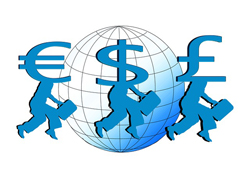 Are you thinking about setting up an e-commerce website or selling products to a foreign audience? If so, then it’s a great idea to think about providing your prospects with a currency conversion service.
Are you thinking about setting up an e-commerce website or selling products to a foreign audience? If so, then it’s a great idea to think about providing your prospects with a currency conversion service.
Currency converting tools allow your prospects to have the price of an international currency transaction converted into their local currency at the purchase or checkout phase. It also allows visitors and customers to view the exact amount their credit card or PayPal account will be charged, expressed in their local currency.
One great benefit of providing currency conversion on your site is that it allows visitors to see and understand pricing in foreign countries in their own local currency, making it it easier for visitors to work out their costs and expenses.
If your site is powered by WordPress, you can add a currency converter to currency conversion to WordPress via a plugin, allowing your visitors to quickly and easily understand the cost of your products.
Currencyr – Currency Converter For WP Websites & Blogs
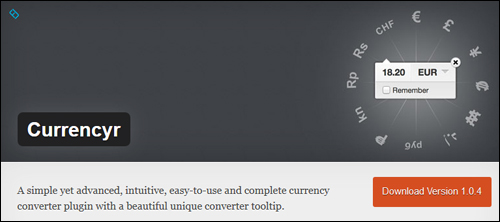
Currencyr is an intuitive, easy-to-use and complete currency converter plugin with a unique converter tooltip. And, it’s free!
Some of the many useful features of this plugin include the following:
- Inline conversion tool
- Supports a number of exchange rates providers, like Yahoo!, Google, Open Exchange Rates, European Central Bank and FoxRates
- WP-Cron task scheduler enabled
- Currency table and converter widget
- Can be integrated with a number of online shopping plugins like WooCommerce and Shopp.
- Can detect local currency automatically
- Full support for language translations
Important: The Currencyr plugin needs your server to be running PHP 5.3.0 or later. Do not use this plugin if you are running an older version of PHP. Ask your web host to check and upgrade your PHP.
***
You can install the currency conversion plugin from your WordPress dashboard by searching for “currencyr” in the Plugins screen and clicking the “Install” button …
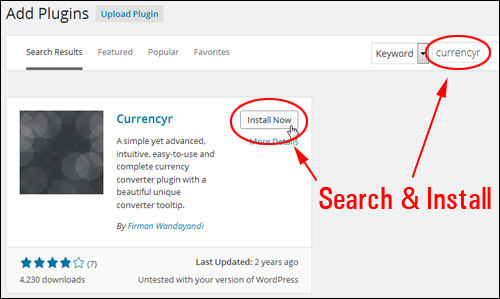
Once the plugin has been installed and activated, you can access the plugin’s settings section by selecting Currencyr from your admin user area …
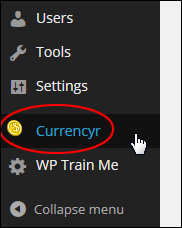
This takes you to the plugin settings section …
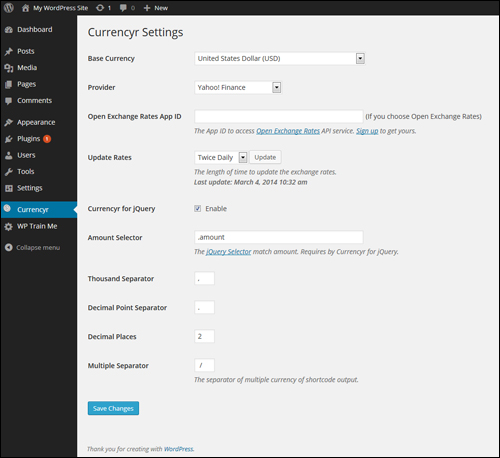
For example, you can select a base currency from a drop-down menu. The default base currency is ’US Dollar’ …
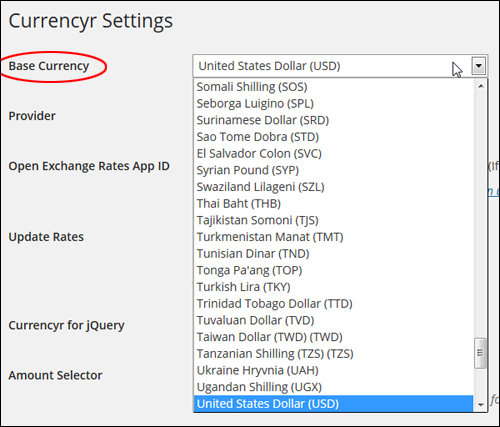
Similarly, you can specify a data provider from a dropdown menu. The default provider is Yahoo Finance, but you can select another provider, such as FoxRate or Open Exchange Rates …

Note: If you select ‘Open Exchange Rates’, you will need an API (Application Programming Interface) ID …

You can specify how frequently you want the exchange rates to be updated by specifying an option from the ‘Update Rates’ dropdown menu …

The Currencyr plugin uses jQuery, which is an open-source library of Javascript code that lets web developers add things like animation effects to web applications (e.g. WordPress plugins).
If you have no reason to edit the jQuery settings, simply ignore this option …

Edit the remainder of the plugin settings and don’t forget to click Save Changes when finished …
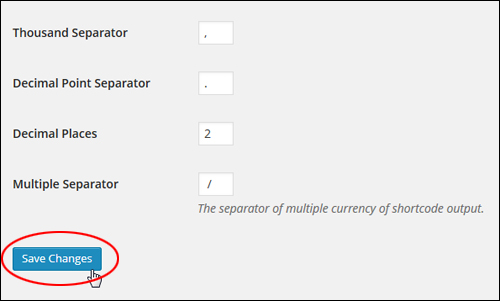
After you have finished configuring your settings, you can add currency conversion to any WordPress page using shortcodes and widgets.
See the ‘Additional Plugin Notes’ section further below to learn how to use currency codes (e.g. USD, AUD, ZAR, etc …) with the Currencyr plugin.
Using Shortcodes
You can easily insert currency conversion into WordPress pages, posts and widgets with no web coding skills or knowledge using shortcodes.
Let’s take a look at some examples of currency shortcodes that you can add to WordPress posts and pages:
Let’s say that you sell an item for a fixed amount (e.g. $175) in US Dollars (USD), and you want to show this price converted into British pounds (GBP) on your product sales page.
All you need to do is insert the shortcode below into your page content …

Note: You can also display amounts in dollars and cents (e.g. 155.25, 47.00, 544.97, etc …)
The screenshot below shows how your shortcode looks when added to your post or page …
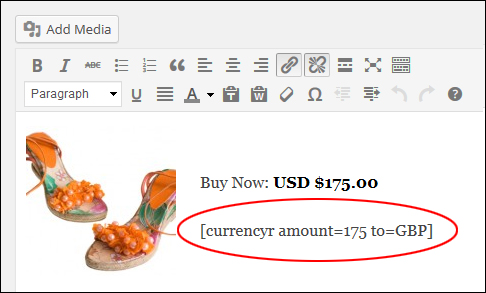
When your page has been published, your currency conversion will appear as you can see below …
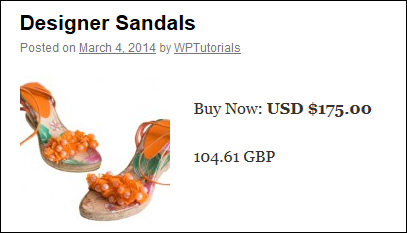
Using the above example, let’s also display the same amount into multiple currency formats.
To do this, use following shortcode (add as many currency symbols as you want by using vertical pipes) …

The example below now shows how the above shortcode looks when inserted into your content …

Once your page has been published, the converted currency will then appear like this …
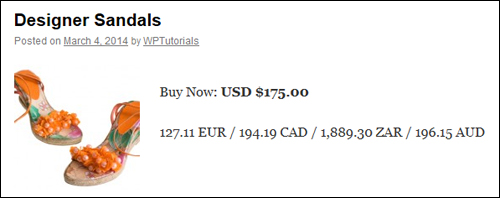
See the ‘Additional Plugin Notes’ section below to learn more about changing the currency separator symbol in this plugin.
Now, suppose you want to select a different base currency than the one selected as the default.
For example, if you have specified your default base currency as EUR and you have a section on your e-commerce pages targeted to non-European customers (e.g. Australia or Canada), you can change the base currency using the following shortcode …

You can see how the shortcode looks when added to a page …
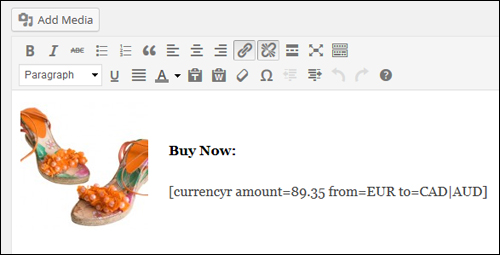
Once your content has been published, the currency conversion will then display as you can see in the screenshot below …
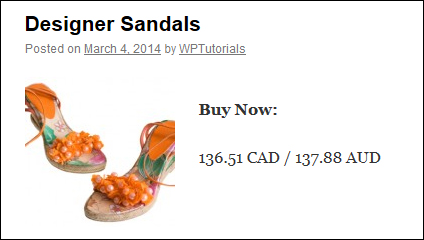
Plugin Widget
You can also insert currency conversion into your website’s sidebar using the plugin’s widget.
To add currency conversion to your sidebar, choose Appearance > Widgets in your WordPress admin menu …
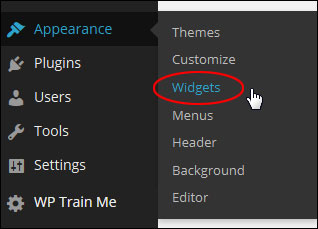
In the Widgets > Available Widgets area find the ‘Currencyr’ widget and drag it to an ‘Active Widgets’ location …
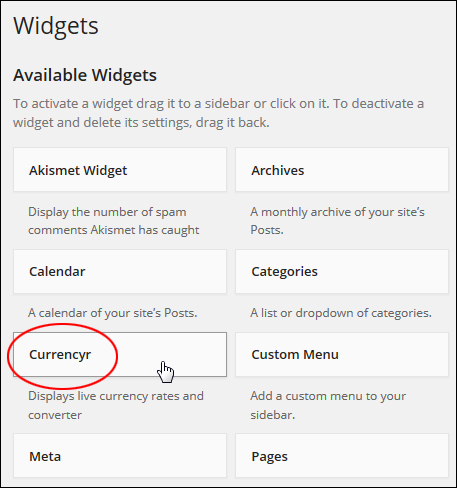
Configure the widget options as shown below (add currency codes separated by commas), and click Save to update your settings …
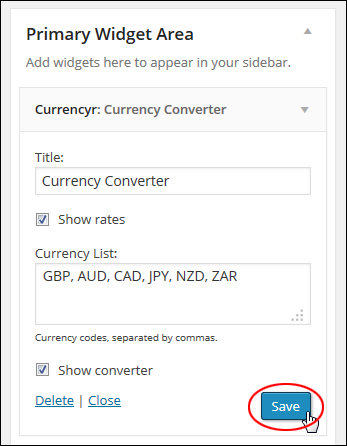
The currency converter tool will now display on the sidebar with the options you have specified …
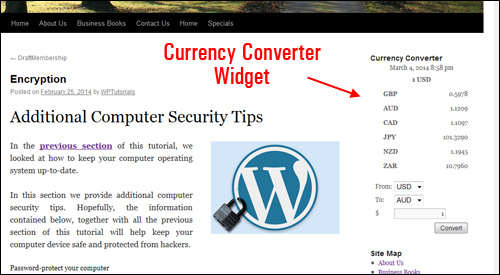
Additional Plugin Notes
Here are some additional notes and useful information about using the plugin.
Currency Separator
The Currencyr plugin lets you specify the symbol to display as the currency separator when using multiple currencies.
You can change the symbol in the ‘Multiple Separator’ settings section.
So, for example, entering the default symbol “/” (forward slash) …

Separates all your currency values with a forward slash as shown below …
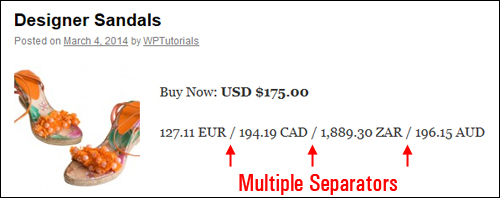
If you modify the symbol and resave your settings …

Your web site visitors will see the new symbol used as the currency separator …
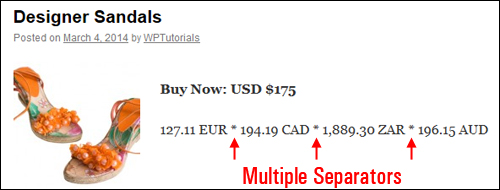
E-Commerce Software Integration
As stated earlier, the plugin can be integrated with various WP-compatible e-commerce plugins such as WooCommerce, WP-eCommerce and Easy Digital Downloads …
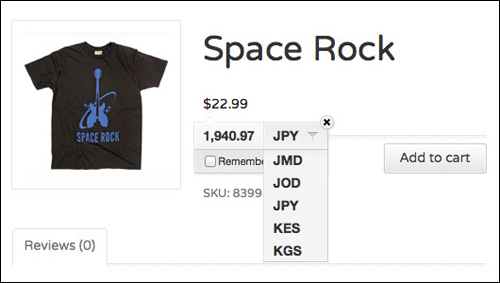
(image sourced from Currencyr plugin website)
Congratulations! Now you know how to easily add a currency converter to your e-commerce website.
To learn more about WordPress e-commerce plugins, see the tutorial below:
***
"I am beyond impressed with what you have put together. I can tell that you put a ton of hard work into building what you have. You have the absolute best content on WordPress I have ever seen!" - Robert T. Jillie